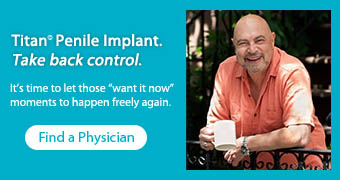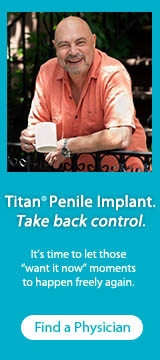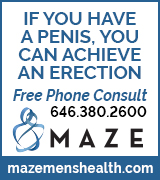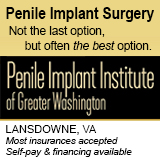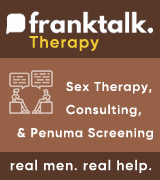Dr Stephen Kopecky: Thank you, Chet.
Dr Rihal: There has been a lot in the literature and in the lay media about erectile dysfunction. Of what importance is that to a cardiovascular specialist? In particular, I refer to the meta-analysis[1] that you published a couple of years ago.
Dr Kopecky: Erectile dysfunction is something that we haven't talked about much in the cardiology office, but we are finding that it is a harbinger of coronary artery diseases. For instance, if you are a 70-year-old man with erectile dysfunction, your risk for coronary disease is increased one to 1.4 times, but if you are a 40-year-old man with erectile dysfunction your risk for coronary disease is 40 to 50 times higher.
Dr Rihal: Steve, just so I am hearing you correctly, you said that for a younger patient in his 40s, erectile dysfunction portends a risk 40 to 50 times higher than usual for coronary disease?
Dr Kopecky: Correct, compared with another man just like him. It is a symptom that comes up, but that we tend to brush under the rug sometimes and laugh about. Instead, we should tell our patients and ourselves and our referring doctors that this is a time we can do something to help the patient, not just his erectile dysfunction, but also his heart.
Dr Rihal: What should we be doing in the office when patients tell us about this history? What is the next step?
Dr Kopecky: When we hear about it, we need to act on it, and look at the patient's cardiovascular risk factors. Why? Because the risk factors for erectile dysfunction and for coronary disease are exactly the same—diabetes, overweight, lack of exercise, poor diet, hypertension, etc. We need to start working on those risk factors, and what I have found when I talk to patients about their risk for heart disease, they say, "Okay, where is my stent and my statin?" But if I talk about erectile dysfunction, they perk up. They start to listen. They say, "Gee, what do I need to do, doctor?"
Dr Rihal: What is the next step of your evaluation? Do you go immediately to aggressive secondary treatments, or are there other things that we should be doing?
Dr Kopecky: The first thing is look at how long the patient has had erectile dysfunction. Erectile dysfunction seems to precede coronary disease by three to five years, which is a nice thing to know. If you have a patient who has had erectile dysfunction for a year or two, say, "Wow, we need to start doing something before you really have a manifestation of coronary disease," and he starts to listen to that and we can do stress tests. We can be very aggressive with their risk factors. The key thing is to start talking to these patients about lifestyle and risk factors.
You mentioned the article we published. We examined what effect working on coronary disease risk factors has on erectile dysfunction. Within about two years, we found that if patients lose some weight and get their risk factors under control, it's equivalent to taking 25 mg of Viagra in terms of the improvement in erectile dysfunction.
Dr Rihal: That is remarkable. What about the medications that are used to treat erectile dysfunction? Are there cardiovascular complications that we need to be aware of—maybe paying more specific attention to?
Dr Kopecky: Clearly, the drugs that we use can affect conditions such as hypertrophic cardiomyopathy. They can increase afterload or the afterload obstruction can increase and cause symptomatic problems such as vasovagal response, lightheadedness or syncope, especially after sex.
Dr Rihal: And of course, the interaction with nitrates is well-known.
Dr Kopecky: Yes, we have to be very careful with nitrates and not give them 24 hours before or after (or vice versa) erectile-dysfunction drugs.
Dr Rihal: How often in your practice have you noticed that there are vascular causes for erectile dysfunction that can be treated endovascularly? Have you come across that in your practice?
Dr Kopecky: It is interesting, and it's part of the hypothesis—why is erectile dysfunction a bellwether for coronary disease? The penile arteries are 1 to 2 mm, and the coronary arteries are 3 to 4 mm. It might be starting to show up a little bit earlier, and there are some data showing that drug-eluting stents have been used to treat some of the smaller arteries that cause erectile dysfunction with good results.
Dr Rihal: Interesting. To summarize, what would be the top two or three messages about erectile dysfunction that you would like to deliver to the cardiology community?
Dr Kopecky: First is that if you hear of erectile dysfunction, it raises your patients' risk for coronary disease no matter what the patient's age or risk factors are. It is an increased risk factor, and the younger the patient, the more it increases his risk. It is helpful in the intermediate-risk patients. In patients who have a lot of disease, we don't really need to know much more about them, but in intermediate-risk patients, I always ask, early on, "Do you have any erectile dysfunction?" And if they do, then I am much more aggressive.
The second thing is that it is important to talk to the patients and tell them that it is an artery problem. It is a blood-flow problem. In a smaller artery, this is starting to occur earlier than the heart arteries, so we need to work on it now. Let's not "wait until later." Patients aren't always very concerned about heart attacks but they are very concerned about erectile dysfunction, so they tend to pay attention, as do their spouses. I saw a patient the other day, and he said, "I had some discomfort when I was raking leaves, and I stopped," and his wife said, "Honey, I was raking leaves with you. You didn't tell me that is why you stopped." It is very hard for the husband to hide erectile dysfunction from his spouse. Take that as a teachable moment to say, "Let's do something not only for your erectile dysfunction, but also for your heart."
Dr Rihal: Do you incorporate it as part of your routine history for a cardiac patient, as a diagnostic prompt, and then use it as a motivator as well?
Dr Kopecky: Correct. It's a risk verifier.
Dr Rihal: My guest today has been Dr Steve Kopecky. This conversation has been very enlightening, and I hope you have found it as useful as I have. I would like to thank you for your attention and invite you to continue to watch more Mayo Clinic videos on theheart.org|Medscape Cardiology. Thank you.
Remember smoking causes more problems to your heart than it does cancer. Wish I had known this before my stents had to go in.
ED & Cardiology ....Mayo Clinic
Return to “General Discussion”
Who is online
Users browsing this forum: No registered users and 22 guests
